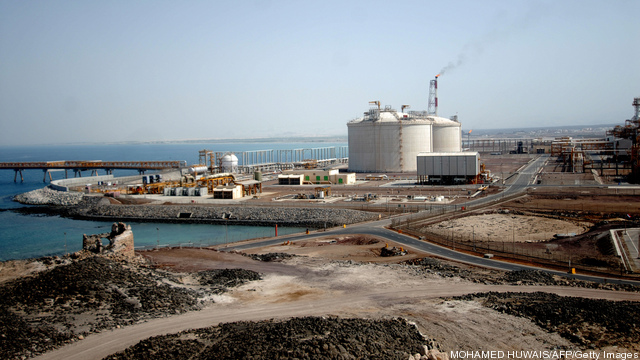Just when it looked like Sino-American relations were finally starting to improve, new satellite images last week showed troubling developments. China has been building artificial islands on reefs in the Spratly islands in the South China Sea at an alarming pace. Not that this would be alarming news per se, but the reefs have been, for all practical purposes, seized from long time US ally the Philippines, which Washington has a mutual defense treaty with. The island group is 1,000 miles from China’s southernmost coast, but just offshore the Philippines, well with in its Exclusive Economic Zone (EEZ).
In response, a Pentagon official said last week that the US might consider sending ships and aircraft to within 12-nautical miles of the built-up reefs (that will reportedly soon have functioning air strips) to demonstrate US commitment to its allies in the region. The stakes in the South China Sea are huge. China claims nearly 90 percent of the sea in a U shape declaration that is often called China’s nine dash line. China has overlapping claims with the Philippines, Malaysia, Taiwan, Brunei and Vietnam in the troubled waters that could also hold considerable oil and natural gas reserves.
As news over China’s controversial land reclamation was breaking, US Secretary of State John Kerry was en route to Beijing to make preparations for Chinese president Xi Jinping’s visit to Washington later this year and to talk about security, economic and trade issues. Once in China, both sides eased back from saber rattling and expressed hopes that the issue could be resolved peacefully. However, China was vehement and never wavered in its stance that the area in question is Chinese sovereign territory and that its determination to safeguard them are “as firm as rock and unshakeable.”
Also, against this backdrop, news broke on Thursday that proved bad timing for the State Department and White House. On Thursday, Reuters reported that Freeport LNG CEO Michael Smith said in a Reuters interview that the US Department of Energy (DOE) had advised American companies to not allow Chinese firms to invest in US liquefied natural gas (LNG) projects. Smith said that the advice contributed to a lack of lucrative US gas export deals with China. He added that he was encouraged during the federal approval process to avoid inviting Chinese participation in case of a political backlash and that Freeport LNG had turned down potential Chinese customers, heeding the DOE’s advice.
The next day Smith backpedaled. He told Reuters on Friday that he had misspoken during the Thursday interview. “The DOE in no way advised Freeport LNG on what customers, or sources of foreign investment, it should choose,” he said. “I regret inaccurately describing the DOE as having advised us as such.” The DOE for their part also offered denials. A DOE spokeswoman said that it did not advise Freeport against sending LNG to Chinese customers or inviting Chinese investment.
Though Smith is seeking obvious damage control over what could arguably be considered the mulligan of his career, he made similar comments during an energy seminar last week in New York attended by Breaking Energy. At the FT Energy Strategies Summit on May 14 the Freeport LNG chief said that his company had interest from a major Chinese company for the entire output of one of the Freeport LNG trains, but the company had to tell them no.
When the summit moderator asked Smith where Freeport’s LNG exports would go and if they had any Chinese customers for its gas, Smith said, in remarks recorded by Breaking Energy, that there are very few Chinese customers who are direct customers because it was mostly a financing issue. “Early on in our project, [we] were quite frankly warned by the DOE that it would not be looked at [as] politically correct for us to have a large Chinese customer and Chinese debt to raise the funding.”
Smith added that if it was just a customer it would not be an issue. “For a Chinese counterparty to be the predominant counterparty you would have to then use Chinese banks and the Chinese would want to have equity in it, they wouldn’t do all debt financing.”
“We were advised, do what you want, but it could be politically difficult,” Smith said. “We actually had one of the largest Chinese energy companies wanting a full train and we told them we couldn’t touch it.” Though Smith didn’t mention the company by name, state-owned China National Petroleum Corporation (CNPC), is that country’s largest integrated oil and gas company, while its publically listed arm PetroChina produces around 4 million barrels of oil per day.
Smith said that BP had sold some of their capacity from the Freeport LNG facility to the Chinese. According to the Freeport website, BP Energy Company, a BP subsidiary, has contracts for 4.4 million tonnes per annum (mtpa) of liquefaction project capacity from Freeport LNG’s second train. Consequently, BP could sell gas it procured from Freeport LNG to Chinese companies without consent from Freeport.
Smith added that he was sure that Mitsubishi and other Japanese companies “might be doing contracts with China,” adding that “there is tremendous demand there [China],” but it’s a “political potato that we just couldn’t take the risk on.”
In neither the Reuters interviews nor the FT Summit last week, did Smith elaborate on the DOE warning he mentioned. However, the DOE is the Federal agency that must give final approval for a US LNG project before it can go forward. No mention has been made in Chinese state-controlled media over Smith’s remarks, at least not yet, however that doesn’t preclude the possibility that Kerry’s Chinese counterparts will address the issue with him this week as the secretary’s visit to China wraps up.

